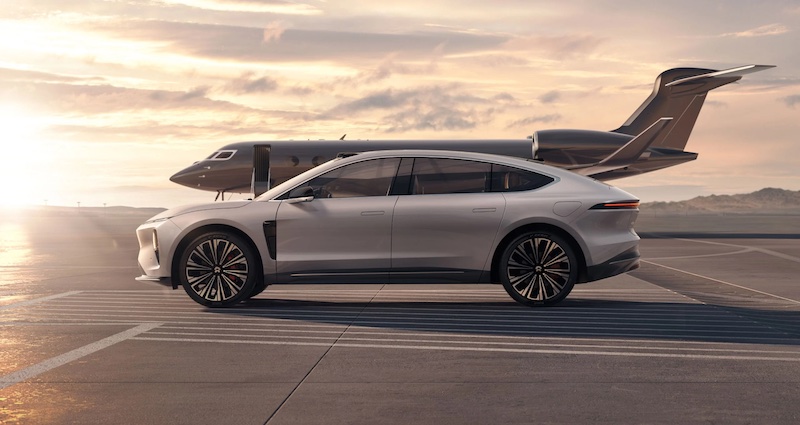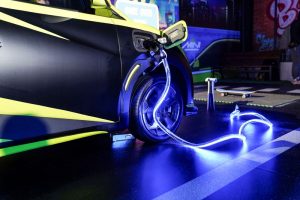Chinese carmaker Nio unveiled its flagship electric vehicle on Saturday, the upmarket ET9 luxury sedan, which will take on Mercedes Benz and Porsche’s top-of-the-range sedans.
The ET9 is still slightly over a year away from delivery – in the first quarter of 2025 – and will be priced at about 800,000 yuan ($112,178), Nio’s founder and chief executive William Li said at the company’s “Nio Day” annual event.
It features self-developed technologies such as an autonomous driving computer chip, a 900-voltage electric drive for fast charging and large cylindrical battery cells, Li said at the event in the northwestern Chinese city of Xian.
Nio hopes the ET9 will help prop up earnings as a bruising price war and slowing car demand weigh on profitability.
ALSO SEE: China’s Geely Says Ship Attacks Will Delay EV Arrivals in EU
Li also touted a chassis featuring a smooth suspension technology that he said is “a generation ahead of Panamera’s”.
Nio, which also announced plans to add 1,000 battery swapping stations and double its public chargers in 2024 in China, is betting on such technology and infrastructure to increase the appeal of its EVs to consumers and improve its profit margin in a consolidating market.
The company won $2.2 billion in new investment this month from Abu Dhabi-backed investment vehicle CYVN Holdings, one of the largest investments a Chinese EV company secured this year.
US startup to supply suspension tech
US startup ClearMotion, which Li’s venture capital firm Nio Capital has invested in, will supply the active suspension technology for the ET9 in a contract covering 750,000 cars over the lifetime of the luxury sedan model, the two companies said on Saturday.
The ET9 should go into production in late 2024.
ClearMotion founder and chief technology officer Zack Anderson said that the company’s ClearMotion1 suspension system uses a combination of hardware – a small unit containing a motor and power electronics sits in each wheel well of a vehicle – and software to read the road ahead and cut motion inside the car by “about 75% compared to the best technology in the market today”.
“We take sensor data and we do very high-speed analytics where we predict what’s about to happen in the road before it hits the chassis of the car,” Anderson said.
He said ClearMotion is talking to numerous other automakers, including in Europe and America, adding that the company expects to publicly announce at least one more customer next year.
ClearMotion currently has a factory in China and aims to build more production close to future customers, Anderson said.
“A lot of people get motion sick if they try to work in a car,” he said. “Motion control is really the key to fixing that.”
At first, the technology will be used for luxury vehicles, as automakers want to use it to make their new EVs stand out, Anderson said.
ClearMotion has raised $350 million to date and its key investors include venture capital firm New Enterprise Associates, Nio’s venture capital arm NIO Capital, venture capital fund Nextview Ventures and JPMorgan.
“We’re looking at probably another capital raise down the road, but right now we’re pretty well financed,” Anderson said.
- Reuters with additional editing by Jim Pollard
ALSO SEE:
Abu Dhabi’s CYVN to Invest a Further $2.2bn in China’s Nio
China’s Nio to Launch Affordable EV brand Firefly in Europe
Carmakers Focus on Cost-Cutting to Rival Cheap Chinese EVs
China’s Nio Signs Geely Up to Auto Battery Swapping Push
Chinese EV ‘Invasion’ Forces Western Rivals to Slash Costs
Europe Assessing Tariffs on Chinese EVs Amid Subsidy Concerns
US Rules to Limit Chinese Access to EV Tax Credits Announced
























